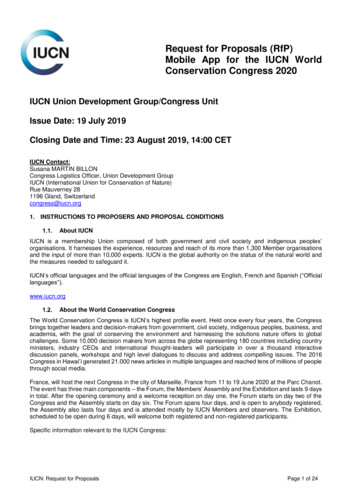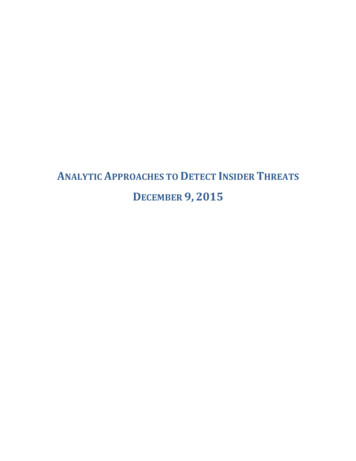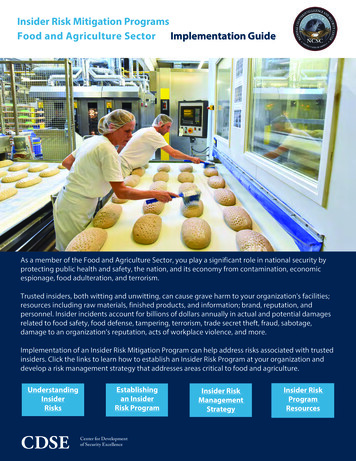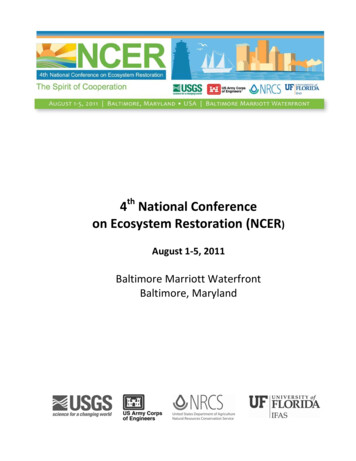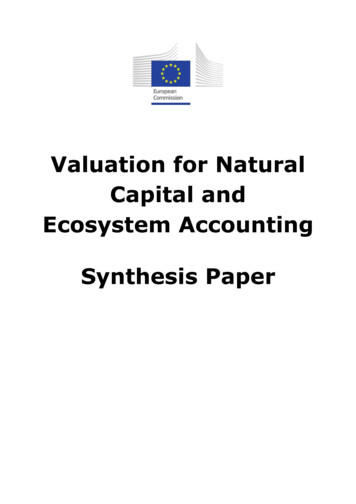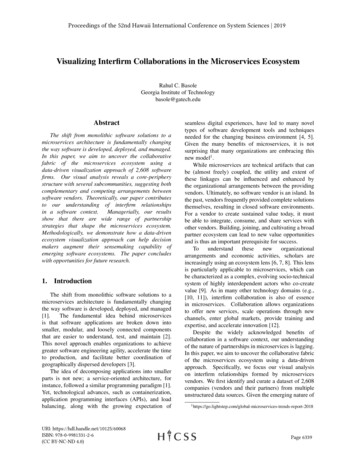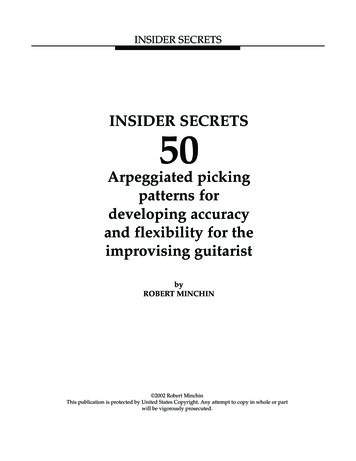
Transcription
View it in a browserForward to a friend View in browserECOSYSTEM INSIDERThe Ecosystem Insider brings you news from the IUCN Commission on Ecosystem ManagementMarch 2018 - Edition 1Follow us for more news and updatesDear IUCN CEM member,We are pleased to bring you the First issue of theIUCN Commission on Ecosystem Management(CEM) Newsletter for 2018CEM HighlightSteering Committee meeting in Pokhara-NepalOur first Steering Committee meeting of 2018 was held inPokhara, Nepal from the 26th February to the 2nd March. Wewere joined by CEM leaders: Shalini Dhyani (South Asia), PCAbhilash (Agro-ecosystems), Himlal Baral (Forest ecosystems),and Alice Hughes (YPN). Stewart Maginnis and Radhika Murtifrom Secretariat and Christopher Howe from IUCN-Asia alsoparticipated. Mangal Man Shakya (Asia Regional Councilrepresentative), Sushila Chattarjee (Nepal focal point CEMmembers) and Dr. Rishi Sah (IUCN members representative)also joined us in different parts of the meeting.Some of the main issues discussed in this SC meeting include:project development mechanisms; a guidebook on commissioncommunication; innovations and ecosystem management;learning to apply the ecosystem approach to landscapemanagement; and white board explanatory videos aboutecosystem management concepts widely used in CEM.Reflections on how our work contributes to the SustainableDevelopment Goals (SDGs) and how to best advance ouractions to show these results was widely discussed as well asour role in generating new knowledge and disseminating it.
National level Red List of Ecosystems (RLE) are being requiredby different actors but we need to make sure that the reach ofthis analytic instrument is clearly understood and its technicalstandards are always used. In this way we can more efficientlymobilize the results these exercises can provide.We also had the opportunity to visit the EbA and Eco-DRR pilotproject sites which were presented by IUCN Nepal ProgramOfficer Anu Adhikari, around Sidhane, Bhadaure and Tamagi.We want to thank the Nepal IUCN office which was of great support for the success of thismeeting.Leadership CornerCEM participation in IPBES 6 PlenaryThe Presentation of the Assessment Report and Summary forPolicy Makers were presented for approval at the sixth sessionof the IPBES Plenary (IPBES-6) held in Medellín, Colombia fromMarch 17-24. Several CEM leaders and members participated indifferent roles in the elaboration of these documents either forthe thematic or regional assessments and many were in themeeting. We want to highlight the participation of theCEM Deputy Chair Madhav Karki in his role as president of theAsia-Pacific assessment (2b Chapter 1), Judy Fisher as leadingcoordinating author on the assessment about land degradation,and Jack Rice as CLA chair for the Americas assessment (2bChapter 1). For more information about the Plenary and itsresults you can access their daily reports: IISD BulletinOutstanding Leadership : Dr. Shalini DhyaniWe want to congratulate Dr. Shalini Dhyani, CEM South Asia RegionalChair. for her excelling performance. She has been able to put inconversation several of our thematic and specialist groups; recentlypublished a book on wild edibles of India entitled “First Food” as well asacademic papers on ecosystem management such as: “Emerging localEconomic and Social Dynamics shaping Forest Landscapes of CentralHimalayas, India”; attends relevant events to our commission such as thepast international conference on Scenarios and Models in Biodiversity andEcosystem Services or the Business and Biodiversity Conference;participates as a lead author for the IPBES regional assessment for AsiaPacific; promotes and organizes regional events as well as being activethrough different communication channels showing regional actions andresults.She has also recruited several new members across South Asia andputs in practice the capacity building she built as a young professional withnow a solid professionalism. Her leadership skills, broad understanding ofecosystem management and capacity to link different aspects of ecosystemmanagement from research, policy-making discussions and networkingamong different stakeholders, are all inspiring practices and admirable skillswe should take into consideration. We are proud to have active, engaged and highly qualifiedleaders such as Dr. Dhyani in CEM. Bravo!!Honoring Dr. Dhrubajyoti Ghosh
CEM has lost an exemplary member. Dr. Dhrubajyoti Ghoshdied on February 16th. A man who was himself an institution,committed to the conservation of the East Kolkata Wetlandsusing Nature based Solutions, winner of LHA 2016, LucHoffmann award winner and scientist who received the UN500award. He was the previous CEM Regional Chair for South Asia.The scientific aspects of Wetlands Ecology were unfolded byhim in a matter of simplicity and strong scientific outlook. Hispupils remember him not only as a great ecologist, but also anexcellent teacher and a noble man. In spite of being a graduatewith Engineering background he made a landmark of studyingEcology in Eastern India. He was the pioneer of WetlandsConservation in Eastern India. Dr. Ghosh left us a strongmessage and legacy of saving the Wetlands throughout theworld for which he was worried most. You can learn more about his legacy at this link.Thematic AreasClimate Change and Biosphere ReservesCEM is co-sponsoring two panels in this conference: 1) on“Ecosystem governance in biosphere reserves for betterconservation and livelihoods” and 2) "Ecosystem-based climatechange adaptation and mitigation: learning and sharing amongcultures". If interested please contact LietteVasseur orEsperanza Arnés Prieto for the first panel, or LietteVasseur),Dawn Horning or Pam McElwee for the second one.Cultural Practices and Ecosystem ManagementDialogues for Collaborative Action on the Links betweenBiological and Cultural Diversity New York 21.22 2018The Cultural Practices and Ecosystem Management (CPEM) hasjoined with the and the American Museum of Natural Historyare to be a co-sponsorsr . of thesea Dialogues forCollaborative Action on the Links between Biological andCultural Diversity to be held in New York City, April 21-222018. Several CPEM members will participate in the ActionGroup on Knowledge Systems and Indicators of Wellbeing atthis dialogue, which aims to produce guidance for national andglobal institutions on indicators for environmental and socialsustainability that are culturally appropriate for local andindigenous peoples. People who are interested in contributingto this project should get in touch with Pam McElwee.Nature-Based SolutionsThe Nature-based Solutions Group is organizing 4regional conferences this year (in Jordan, India, Spainand Brazil)For more information visit the ESP Partnership.
Results of the Nbs TG workshop at the ESP areavailable here.Systemic PesticidesThe first two chapters of the 2nd Worldwide IntegratedAssessment of the Impact of Systemic Pesticides onBiodiversity and Ecosystems (WIA II) appeared online inNovember: 1st chapter and 2nd chapterThe publication of its final two chapters, WIA II are currentlybeing completed. Also, two major papers were published inOctober , “A worldwide survey of neonicotinoids in honey” inScience and “More than 75 percent decline over 27 years intotal flying insect biomass in protected areas” in PLOSone.The TFSP annual meeting of 2017 was hosted by its membersat Padua University. In addition to the plenary meeting, twointerim review meetings of reports prepared by the workinggroups on Alternatives and Public Health also took place. One third of the Task Force was able toattend, including several new members from East Asia. Thanks to an excellent organizationparticipants qualified it as ‘productive and stimulating’. One of its outcomes is a meeting ofmembers in East Asia during the first semester of 2018 to coordinate activities.REGIONAL NEWSCentral America and MexicoCEM Mexico, Central America and Spanish SpeakingCaribbean held its first face-to-face virtual reflectionmeeting for 2018The meeting took place in the Tropical Scientific Center , CostaRica. Dr. Bernal Herrera, CEM Vice Chair for Latin America,made a presentation on CEM and its priority issues, as well asits internal organization. Interesting proposals were made on:joint work such as webinars on Ecosystem based Adaptation,activating CEM membership and strengthening the CEM YoungProfessional Network in the region.South AsiaMaster Class Workshop on "Ecosystem Management,Nature Based Solutions and SDGs: Perspetives fromSouth Asia"4 December 2017, New Delhi, India.Organized by IUCN CEM South Asia members and Leaders forNature, India in collaboration with National EnvironmentalEngineering Research Institute (CSIR-NEERI) the workshopemphasized on bringing together and developing a multistakeholder dialogue to discuss ecosystem managementapproaches considering the Sustainable Development Goals(SDG) 11,12,13 and 14 and associated National BiodiversityTargets based on Aichi Targets, 2010.The workshop can be accessed here.Spotlight on Ecosystems
Holarctic SteppesFrom extinction to free ranging by successfulreintroduction : 25th anniversary of the reintroduction ofPrzewalski’s horse:2017 witnessed the 25th anniversary of the Przewalski’s horse(Mongolian name: Takhi) reintroduction in Mongolia. ThePrzewalski’s horse is the last remaining truly wild horse speciesin the world. Extinct in the wild in 1960’s, it survived thanks toa successful reintroduction program that began in 1992 when16 Przewalski’s horses were reintroduced in the Hustai NationalPark thanks to the Dutch NGO FRPH and the Mongolian NGOMACNE’s. Today, more than 500 Przewalski’s horses are freeranging in Mongolia, which is the highest number of freeranging Przewalski’s horses in the world. In consequence, theworld population status according to The IUCN Red List ofThreatened Species changed from Extinct in the Wild to Critically Endangered in 2008, and toEndangered in 2011.Read More.For more information visit the Hustai National Park website or write to Takhi.Agro-ecosystemsThe IUCN CEM Agroecosystem Specialist Group hasconducted extensive field surveys in Indo-Gangetic Plain ofNorth India to document various resource conservationpractices employed by the farmers for subsistence farming. 18traditional and local varieties of rice, 3 legumes varieties, 10vegetables, and 5 leafy vegetables were collected forestablishing a community gene bank. at farmer’s field fordemonstration and awareness creation. The Group interactedwith farmers on exploitation of modern technologies such assolar power, drip irrigation, introduction of high yielding andnew crops, etc. to enhance the sustainability of agriculturalproduction.The group is preparing Fact Sheets of various traditional varieties alongwith their nutritional qualities, cultivation practices, global distributionpattern, and conservation measures. Members of the IUCN CEMAgroecosystem Specialist Group attended several local, regional andinternational events (including the 47th SC Meeting of CEM) and theGroup Lead has been elected Fellow of the National Academy ofAgricultural Sciences (NAAS), India. The Group is widening itsmembership to various agroecological regions of the world and alsofinalizing the second issue of the ‘Agroecosystem’ newsletter.What's on the Calendar ?Call for Papers
Earth Observation for the Sustainable Development Goals Specialissue of Remote Sensing of Environment : submit expression ofinterest by 31 March 2018The papers should highlight the Sustainable Development Goal andtarget(s) that the research contributes to advance. .For more information contact Professor Graciela Metternicht or visitthe Elsevier websiteCall for AbstractsEcosystem-based adaptation in Biosphere Reserves,April 23A book that will together three of CEM’s thematic groups –Ecosystem-based Adaptation and Mitigation, BiosphereReserves, and Ecosystem Governance – in order to moveforward this agenda by understanding how an ecosystem-basedapproach can be used to enhance sustainability in biospherereserves. The book will include a series of case studies toinitiate discussions regarding commonalities, lessons learned,and good practices that can be replicable in othercircumstances.Abstracts should be between 250-300 words. Contact AngelaBoag for information or for sending in the abstract.ConferencesEn Canoa: Hacia Una Cultura de la Naturaleza: "InCanoe: Towards a Culture of Nature" June 25-28 2018An international conference that will focus on scientificexpeditions that link biodiversity and human geographythrough fluvial and maritime routes. To be held June 25-28, inHavana, Cuba, the conference celebrates the 30th anniversaryof the 1987 expedition of Antonio Nunez Jimenez that startedin Ecuador's Rio Napo, connected via the Amazon River toBrazil and Venezuela, and continued into the Caribbean bycanoe through the Lesser Antilles and Haiti, before ending inCuba.Coordinated by the Fundación Antonio Nuñez Jiménez, IUCN'sonly member in Cuba, the conference will take place inHavana's Museum of Natural History and is modeled on IUCN'sWorld Conservation Congress in Hawaii focused on canoeroutes throughout the region. The conference’s scientificcommittee is now seeking abstracts for proposals aboutresearch related to scientific expeditions through fluvial routesglobally; human geography and geohistory; bioculturalconnectivity from the Amazon to the Caribbean; climate changein the Amazon basin, Orinoco, and the Caribbean; andindigenous populations.Abstracts and requests for information can be sent to the conference organisers.Deadline for abstracts is April 10, 2018.
Conference on bamboo and rattan for green growthBamboo and rattan are used across the world for a huge rangeof products - from paper and packaging to fuel and furniture.These strategic plants can store carbon at a very fast rate,build earthquake-resistant housing, and give millions of peoplea more secure source of income. Increasingly, governments areusing bamboo and rattan as strategic tools to fulfil theSustainable Development Goals, and more businesses arelooking to use bamboo and rattan as low-carbon, renewable alternatives to traditional materials.Everyone can benefit from bamboo and rattan, but ‘silo’ thinking tends to prevent thewidespread take-up of sustainable solutions. On 25-27 June 2018, the International Bamboo andRattan Organisation (INBAR) and the State Forestry Administration of China aim to kickstart theconversation, by hosting the Global Bamboo and Rattan Congress in Beijing, China. This will bethe first international, policy-focused symposium dedicated specifically to the sustainable, greenand inclusive development of bamboo and rattan. Over 1000 people are expected to attend,including leading lights from the private sector and high-level government officials from Chinaand elsewhere. The event should be of interest to industry leaders and world experts; seniorpolicy makers; high-level representatives from international organisations and institutionsinterested in sustainable development, industry and infrastructure.Want to find out how bamboo and rattan could change your work? We warmly invite all CEMmember, colleagues and partners of IUCN to take part in this important discussion. For moreinformation, and to register, please visit the conference website.PUBLICATIONSLand Use and Spatial Planning to Support Sustainable LandManagement. Springer Nature.This book written by Professor Graciela Metternicht, co-lead of theCEM Dryland Specialist Group, reconciles competing and sometimescontradictory forms of land use, while also promoting sustainable landuse options. It highlights land use planning, spatial planning, territorial (or regional) planning,and ecosystem-based or environmental land use planning as tools that strengthen landgovernance. Further, it demonstrates how to use these types of land-use planning to improveeconomic opportunities based on sustainable management of land resources, and to developland use options that strike a balance between conservation and development objectives.More information about the bookIUCN (International Union for Conservation of Nature) 2018The quarterly monthly e-Bulletin of the IUCN Commission on Ecosystem Management (CEM) aims to keepIUCN CEM members, IUCN staff, and the wider IUCN network up-to-date with Ecosystem news and announcements.Past issues are available on the IUCN Commission on Ecosystem Management website.Other IUCN Commission Newsletters: SSC - WCPAForward to a friend - Want to unsubscribe or change your details?
published a book on wild edibles of India entitled " First Food" as well as academic papers on ecosystem management such as: "Emerging local Economic and Social Dynamics shaping Forest Landscapes of Central Himalayas, India"; attends relevant events to our commission such as the
